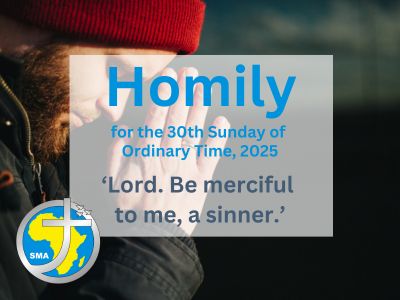Readings: Ecclesiasticus 35:12-14, 16-19; 2 Timothy 4:6-8, 16-18; Luke 18:9-14
Theme: ‘Lord. Be merciful to me, a sinner’ (Lk 18:13)
By Michael McCabe, SMA.
Today’s Scripture readings link the themes of prayer and humility. The first reading from the book of Ecclesiasticus assures us that ‘the prayer of the humble pierces the clouds’ (Ecc 35:17). The responsorial psalm echoes the same sentiment: ‘The Lord is near to the broken-hearted; he helps those whose spirit is crushed’ (Ps 34:18). In the Gospel reading from Luke, which recounts the memorable parable of the Pharisee and the Tax-collector, Jesus illustrates the kind of prayer that is acceptable to the Lord. Luke draws our attention to the audience Jesus had in mind when he spoke this parable, namely, ‘people who prided themselves on being upright and despised everyone else’ (Lk 18:9). The parable tells the story of two men who go to the Temple to pray: one a respected and law-abiding Jew, a Pharisee; the other a renegade and despised Jew, a Tax-collector and, therefore, a collaborator with the hated Roman colonisers. The story contrasts vividly the prayers of these different characters.
The Pharisee stands up (probably near the front of the Temple) and thanks the Lord that he is different from, and superior to, several categories of disreputable persons: the greedy, the unjust, adulterers, and, worst of all, tax-collectors. To our 21st century ears, his prayer seems so brazenly self-congratulatory as to be laughable. Indeed, God may well be laughing at him. Yet, allowing for some exaggeration, his prayer is quite close to the way pious Jews were taught to pray, as reflected in the Talmud (a practical guide to interpreting and applying the Torah to everyday life): ‘Praised be the Lord that he did not make me a heathen for all the heathens are as nothing before him’. While we might not imagine ourselves praying openly in this way, we could ask ourselves if we sometimes secretly regard ourselves as better than others and more worthy of God’s love and care than they are!
Unlike the Pharisee, the Tax-collector, whose profession made him ‘unclean’ and an unwelcome presence in the Temple, stands ‘some distance away’ (probably near the entrance). ‘Not daring even to raise his eyes to heaven’, he beats his breast and prays simply and earnestly: ‘God, be merciful to me, a sinner’ (Lk 18:13). Clearly, here is a man whose spirit has been broken. He knows he has no ‘brownie points’ to claim any credit with the Lord. And, unlike the Pharisee, he doesn’t compare himself with anybody else. Nor does he make excuses for his egregious failure to be a good Jew and abide by the commandments of the Law. He just throws himself entirely on God’s mercy. And Jesus tells us that God heard his man’s prayer and not the self-serving prayer of the Pharisee who prayed ‘to himself’ (Lk 18:11): ‘This man, I tell you, went home again justified; the other did not’ (Lk 18:14).
Today’s readings, especially the gospel, teaches us that God wants us to be honest and real when we approach him in prayer, to acknowledge the cracks in our lives and open our hearts to him. We are far from perfect but we shouldn’t be discouraged by this or pretend to be better than we are, or better than some others. As the famous Canadian poet and singer, Leonard Cohen, reminds us: ‘There is a crack in everything. That’s how the light gets in’. When we bring our broken spirits, our broken hearts to God; when we abandon ourselves to his mercy, as the Tax-collector did, then we are giving him a chance to make something of us. We are letting God in, and that is when healing and transformation takes place. In the words of the poet, Patrick Kavanagh, ‘We must be nothing,/Nothing that God may make us something….Let us lie down again/Deep in anonymous humility and God/May find us worthy material for his hand’ (from his poem, Having Confessed).
Today, we live in a world where many people hide their brokenness, covering up the cracks in their lives, and pretending to be better than others, often judging them mercilessly. The only antidote to this false pride and arrogance is to present ourselves to God as we are, cracks and all, and let him heal us. This is really what the parable of the Pharisee and the Tax-collector is all about. It is about having our broken hearts healed, by allowing God’s loving mercy to flow into them. Then we, in turn, may be sources of healing for our broken messed-up world.
I conclude with a challenging reflection on today’s gospel from the pen of Fr Flor McCarthy, SDB.
Sinners in Church
If the Pharisee had his way, the Tax-Collector
would not have been allowed into the Temple at all.
Some people believe that sinners should never go to church.
They cry ‘hypocrites’ at those who do.
According to them only saints should be admitted to church.
But that would result in a very small church,
and would make as little sense as a repair shop
that accepted only sound things,
or a hospital that accepted only healthy people.
We go to church not because we are worthy,
but because we need to.
We are brave enough to admit our sinfulness,
but are willing to strive for something better.
We need the healing mercy of God,
as well as the support of the community,
if our efforts at self-improvement are to bear fruit.
Listen to an alternative Homily by Tom Casey, SMA:

